This article needs additional citations for verification .(October 2012) |
Timmalapura is a temple city in Bellary district, Karnataka, India. [1]
This article needs additional citations for verification .(October 2012) |
Timmalapura is a temple city in Bellary district, Karnataka, India. [1]



Shaolin Monastery, also known as Shaolin Temple, is a monastic institution recognized as the birthplace of Chan Buddhism and the cradle of Shaolin kung fu. It is located at the foot of Wuru Peak of the Songshan mountain range in Dengfeng County, Henan province, China. The name reflects its location in the ancient grove of Mount Shaoshi, in the hinterland of the Songshan mountains. Mount Song occupied a prominent position among Chinese sacred mountains as early as the 1st century BC, when it was proclaimed one of the Five Holy Peaks. It is located some 48 km (30 mi) southeast of Luoyang, the former capital of the Northern Wei Dynasty (386–534), and 72 km (45 mi) southwest of Zhengzhou, the modern capital of Henan Province.

The Temple in Jerusalem, or alternatively the Holy Temple, refers to the two religious structures that served as the central places of worship for Israelites and Jews on the modern-day Temple Mount in the Old City of Jerusalem. According to the Hebrew Bible, the First Temple was built in the 10th century BCE, during the reign of Solomon over the United Kingdom of Israel. It stood until c. 587 BCE, when it was destroyed during the Babylonian siege of Jerusalem. Almost a century later, the First Temple was replaced by the Second Temple, which was built after the Neo-Babylonian Empire was conquered by the Achaemenid Persian Empire. While the Second Temple stood for a longer period of time than the First Temple, it was likewise destroyed during the Roman siege of Jerusalem in 70 CE.

A temple is a place of worship, a building used for spiritual rituals and activities such as prayer and sacrifice. By convention, the specially built places of worship of some religions are commonly called "temple" in English, while those of other religions are not, even though they fulfill very similar functions. The religions for which the terms are used include the great majority of ancient religions that are now extinct, such as the Ancient Egyptian religion and the Ancient Greek religion. Among religions still active: Hinduism, Buddhism, Sikhism, Jainism, Zoroastrianism, the Baháʼí Faith, Taoism, Shinto, Confucianism.
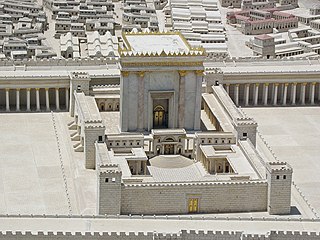
The Second Temple was the reconstructed Temple in Jerusalem, in use between c. 516 BCE and its destruction in 70 CE. In its last phase it was enhanced by Herod the Great, the result being later called Herod's Temple. Defining the Second Temple period, it stood as a pivotal symbol of Jewish identity and was central to Second Temple Judaism; it was the chief place of worship, ritual sacrifice (korban), and communal gathering for Jews. As such, it attracted Jewish pilgrims from distant lands during the Three Pilgrimage Festivals: Passover, Shavuot, and Sukkot.
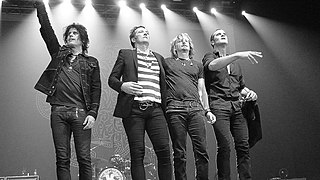
Stone Temple Pilots is an American rock band formed in San Diego, California, in 1989. Originally consisting of Scott Weiland, brothers Dean (guitar) and Robert DeLeo, and Eric Kretz (drums), the band's lineup remained unchanged from its formation until the firing of Weiland in February 2013. Vocalist Chester Bennington joined the band in May 2013 but left amicably in November 2015. In 2016, STP launched an online audition for a new lead vocalist; Jeff Gutt was announced as STP's new lead singer on November 14, 2017.

Mary Temple Grandin is an American academic, inventor, and ethologist. She is a prominent proponent of the humane treatment of livestock for slaughter and the author of more than 60 scientific papers on animal behavior. Grandin is a consultant to the livestock industry, where she offers advice on animal behavior, and is also an autism spokesperson.

International Society for Krishna Consciousness (ISKCON), commonly referred to as the Hare Krishna movement, Gaudiya Vaishnava Hindu religious organization. It was founded by A. C. Bhaktivedanta Swami Prabhupada. on July 13, 1966, in New York City. ISKCON's main headquarters is in Mayapur, West Bengal, India and it claims approximately 1 million members globally.

Angkor Wat is a Hindu-Buddhist temple complex in Cambodia. Located on a site measuring 162.6 hectares within the ancient Khmer capital city of Angkor, it is considered the largest religious structure in the world by Guinness World Records. Originally constructed in 1150 CE as a Hindu temple dedicated to the deity Vishnu, it was gradually transformed into a Buddhist temple towards the end of the century.

The Peoples Temple Agricultural Project, better known by its informal name "Jonestown", was a remote settlement in Guyana established by the Peoples Temple, an American cult under the leadership of Jim Jones. Jonestown became internationally infamous when, on November 18, 1978, a total of 918 people died at the settlement, at the nearby airstrip in Port Kaituma, and at a Temple-run building in Georgetown, Guyana's capital city. The name of the settlement became synonymous with the incidents at those locations.

James Warren Jones was an American cult leader and mass murderer who founded and led the Peoples Temple between 1955 and 1978. In what Jones termed "revolutionary suicide", Jones and the members of his inner circle planned and orchestrated a mass murder-suicide in his remote jungle commune at Jonestown, Guyana, on November 18, 1978. Jones and the events that occurred at Jonestown have had a defining influence on society's perception of cults.

Temple University is a public state-related research university in Philadelphia, Pennsylvania. It was founded in 1884 by the Baptist minister Russell Conwell and his congregation Grace Baptist Church of Philadelphia then called Baptist Temple.

Shirley Temple Black was an American actress, singer, dancer, and diplomat, who was Hollywood's number-one box-office draw as a child actress from 1934 to 1938. Later, she was named United States Ambassador to Ghana and Czechoslovakia, and also served as Chief of Protocol of the United States.
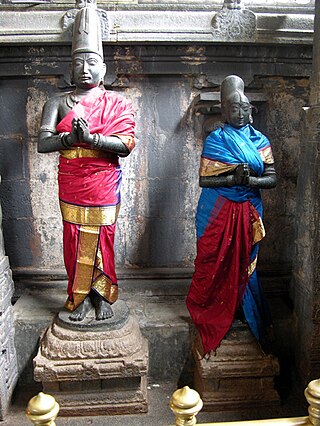
Achyuta Deva Raya was an emperor of Vijayanagara who succeeded his older brother, Krishnadevaraya, after the latter's death in 1529 CE.

A Hindu temple, also known as Mandir, Devasthanam, Pura, or Koil, is a sacred place where Hindus worship and show their devotion to deities through worship, sacrifice, and prayers. It is considered the house of the god to whom it is dedicated. Hindu temple architecture, which makes extensive use of squares and circles, has its roots in Vedic traditions, which also influence the temples' construction and symbolism. Through astronomical numbers and particular alignments connected to the temple's location and the relationship between the deity and the worshipper, the temple's design also illustrates the idea of recursion and the equivalency of the macrocosm and the microcosm. A temple incorporates all elements of the Hindu cosmos—presenting the good, the evil and the human, as well as the elements of the Hindu sense of cyclic time and the essence of life—symbolically presenting dharma, artha, kama, moksha, and karma.

The Jagannath Temple is a Hindu temple dedicated to the god Jagannath, a form of Vishnu in Hinduism. It is located in Puri in the state of Odisha, situated on the eastern coast of India. As per temple records, King Indradyumna of Avanti built the main temple of Jagannath at Puri. The present temple was rebuilt from the tenth century onwards, on the site of the pre-existing temples in the compound, but not the main Jagannath temple, and begun by Anantavarman Chodaganga, the first king of the Eastern Ganga dynasty. Many of the temple rituals are based on Oddiyana Tantras which are the refined versions of Mahayana Tantras as well as Shabari Tantras which are evolved from Tantric Buddhism and tribal beliefs respectively. The local legends link the idols with aboriginal tribes and the daitapatis (servitors) claim to be descendants of the aboriginals. The temple is one of the 108 Abhimana Kshethram of the Vaishnavite tradition.

Ballari, formerly Bellary, is a major district in Karnataka. It is located at north-eastern part of Karnataka. This district belongs to Kalyana-Karnataka. This district was one of the biggest districts in Karnataka until the Vijayanagara district was carved out of Ballari district in 2021 officially.
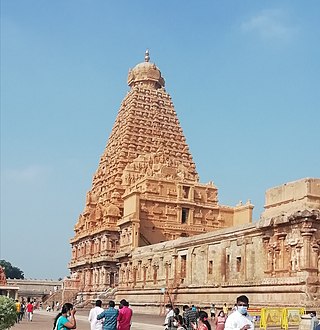
Brihadishvara Temple, called Rajarajesvaram by its builder, and known locally as Thanjai Periya Kovil and Peruvudaiyar Kovil, is a Shaivite Hindu temple built in a Chola architectural style located on the south bank of the Cauvery river in Thanjavur, Tamil Nadu, India. It is one of the largest Hindu temples and an exemplar of Tamil architecture. It is also called Dakshina Meru. Built by Chola emperor Rajaraja I between 1003 and 1010 CE, the temple is a part of the UNESCO World Heritage Site known as the "Great Living Chola Temples", along with the Chola-era Gangaikonda Cholapuram temple and Airavatesvara temple, which are about 70 kilometres (43 mi) and 40 kilometres (25 mi) to its northeast respectively.

Surya is the Sun as well as the solar deity in Hinduism. He is traditionally one of the major five deities in the Smarta tradition, all of whom are considered as equivalent deities in the Panchayatana puja and a means to realise Brahman. Other names of Surya in ancient Indian literature include Aditya, Arka, Bhanu, Savitr, Pushan, Ravi, Martanda, Mitra, Bhaskara, Prabhakara, Kathiravan, and Vivasvan.
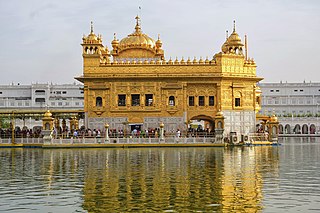
The Golden Temple (also known as the Harmandir Sahib, or the Darbār Sahib, is a gurdwara located in the city of Amritsar, Punjab, India. It is the pre-eminent spiritual site of Sikhism. It is one of the holiest sites in Sikhism, alongside the Gurdwara Darbar Sahib Kartarpur in Kartarpur, and Gurdwara Janam Asthan in Nankana Sahib.
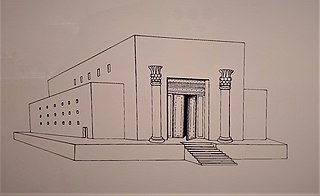
Solomon's Temple, also known as the First Temple, was a biblical Temple in Jerusalem believed to have existed between the 10th and 6th centuries BCE. Its description is largely based on narratives in the Hebrew Bible, in which it was commissioned by biblical king Solomon before being destroyed during the Siege of Jerusalem by Nebuchadnezzar II of the Neo-Babylonian Empire in 587 BCE. No remains of the destroyed temple have ever been found. Most modern scholars agree that the First Temple existed on the Temple Mount in Jerusalem by the time of the Babylonian siege, and there is significant debate among scholars over the date of its construction and the identity of its builder.